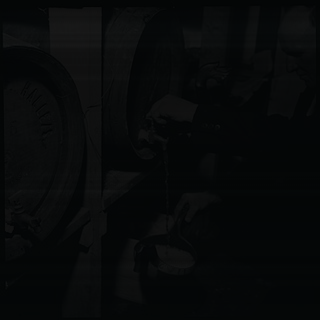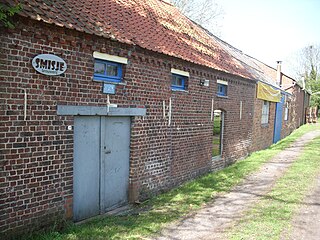
Carlsberg A/S is a Danish multinational brewer. Founded in 1847 by J. C. Jacobsen, the company's headquarters is in Copenhagen, Denmark. Since Jacobsen's death in 1887, the majority owner of the company has been the Carlsberg Foundation. The company's flagship brand is Carlsberg. Other brands include Tuborg, Kronenbourg, Somersby cider, Holsten, Neptun, Belgian Grimbergen, Fix, one of Greece's oldest brands and more than 500 local beers. The company employs around 41,000 people, primarily in Europe and Asia. Carlsberg is currently the 6th largest brewery in the world based on revenue.

Craft beer is a beer that has been made by craft breweries, which typically produce smaller amounts of beer, than larger "macro" breweries, and are often independently owned. Such breweries are generally perceived and marketed as emphasising enthusiasm, new flavours, and varied brewing techniques.

Smoked beer is a type of beer with a distinctive smoke flavour imparted by using malted barley dried over an open flame.

A keg is a small cask.

Pittsburgh Brewing Company is a beer company headquartered in the Lawrenceville neighborhood of Pittsburgh, Pennsylvania, United States best known for producing brands such as Iron City Beer, I.C. Light Beer, I.C. Light Mango, Old German, and Block House Brewing. Until August 2009, all production was conducted at its Lawrenceville facility. From August 2009 to 2021, their products were contract brewed at City Brewing Company in the facility once produced Rolling Rock. On February 4, 2021, Iron City Beer's Instagram account announced that Pittsburgh Brewing Company would resume production of its own product in a new production brewery in Creighton, Pennsylvania, in the original Pittsburgh Plate Glass Company plant. At its opening, the facility is capable of producing 150,000 BBLs of beer annually.

Beer in Norway has a long history, stretching back more than a millennium. Until some 200 years ago, most farms where it was possible to grow grain south of the Arctic Circle, brewed their own beer. From the early 20th century brewing was industrialized and home brewing was restricted. Significant consolidation in the brewing sector reduced the number of major breweries to just a handful. With the exception of the farmhouse ales, most beer styles brewed in Norway trace their ancestry to central Europe.

Beer in South Africa has a long history, with a corporate history dating back to the early 20th century.

Palm Breweries is a brewery company. It owns several different Belgian breweries. Total production was 1,700,000 hl of beer in 2004. The brewery was a member of the Belgian Family Brewers society until 2016.

Brazil is the world's third largest beer market with total volume at 139 million hectoliters, and per capita consumption 61 liters in 2016.
Beer is a very popular alcoholic beverage in Turkey. Commonly, lager type beers are popular.

In Syria, the production and distribution of beer was controlled by the government, and most widely sold through the army's Military Social Establishment supermarket chain and through mini markets in city centres and Christian as well as Muslim areas. Beers imported from Lebanon are not common, although brands like Lebanese Almaza, Tuborg, and Beirut, as well as Turkish Efes are popular and available in hotels, restaurants and most shops in different parts of cities like Damascus, Aleppo, Latakia, Tartus and Qamishli. Production of the country's two local brands, al-Shark and Barada was halted in 2011 due to the outbreak of civil war. A new brewery known as Afamia was opened in 2010 in Adra near Damascus. By the end of 2017, the Arados brewery was opened in the town of Safita in Tartus Governorate.

Alvinne is a small brewery in the hamlet of Moen near the Belgian city of Zwevegem, founded in 2002.

The Smisje Brewery, with a tiny production of only 200 hectoliters per year, is one of the smallest existing Belgian craft breweries. Begun in 1995 by former printer and homebrewer Johan Brandt, it was originally titled "De Regenboog", the same name as his earlier printing business. Brandt is also a bee-keeper, which accounts for the prominent use of honey in some of the brewery's offerings, including its first commercial beer, which was named 't Smisje or "the little blacksmith" to reflect the hand-crafted nature of the product as well as a local landmark blacksmith's house near the brewery's original location.

A brewery or brewing company is a business that makes and sells beer. The place at which beer is commercially made is either called a brewery or a beerhouse, where distinct sets of brewing equipment are called plant. The commercial brewing of beer has taken place since at least 2500 BC; in ancient Mesopotamia, brewers derived social sanction and divine protection from the goddess Ninkasi. Brewing was initially a cottage industry, with production taking place at home; by the ninth century, monasteries and farms would produce beer on a larger scale, selling the excess; and by the eleventh and twelfth centuries larger, dedicated breweries with eight to ten workers were being built.
Brouwerij De Molen is a small brewery, distillery and restaurant in Bodegraven, the Netherlands. The brewery, whose name means The Mill, is in a windmill called De Arkduif, built in 1697. The premises also include the brewery taproom and a retail beer store offering European and American craft beers, as well as regional products such as farm cheese.

Mikkeller is a craft brewery founded in 2006 in Copenhagen, Denmark that was originally based on the so-called "cuckoo", "phantom" or "gypsy" ethos; that is, the company does not operate an official brewery and, instead pays a brewery in Belgium to produce their beer. The company now operates several brewpubs, such as Warpigs in Copenhagen and Mikkeller Brewpub London. Mikkeller was founded by two home brewers: Mikkel Bjergsø, a high school teacher, and journalist Kristian Klarup Keller. Both sought to introduce their home-brewed beer to the public and to "challenge beer friends with intense new tastes", drawing inspiration from the American breweries that "aren't afraid to play and break all the rules".

Most beer sold in France is pilsner lager, mass-produced by major breweries which control over 90% of the market, although there are also traditional beer styles, such as top-fermented Bière de Garde, and a number of microbreweries.
Wermlands Brygghus is a microbrewery located in Kristinehamn, Värmland, in the west of central Sweden.

Svalbard Bryggeri is a microbrewery in Longyearbyen at the island of Spitsbergen, the archipelago of Svalbard, Norway. Svalbard Bryggeri at 78° North is the northernmost commercial brewery in the world.

















